Jeffrey M. Schwartz Quotes & Sayings
Enjoy the top 49 famous quotes, sayings and quotations by Jeffrey M. Schwartz.
Famous Quotes By Jeffrey M. Schwartz
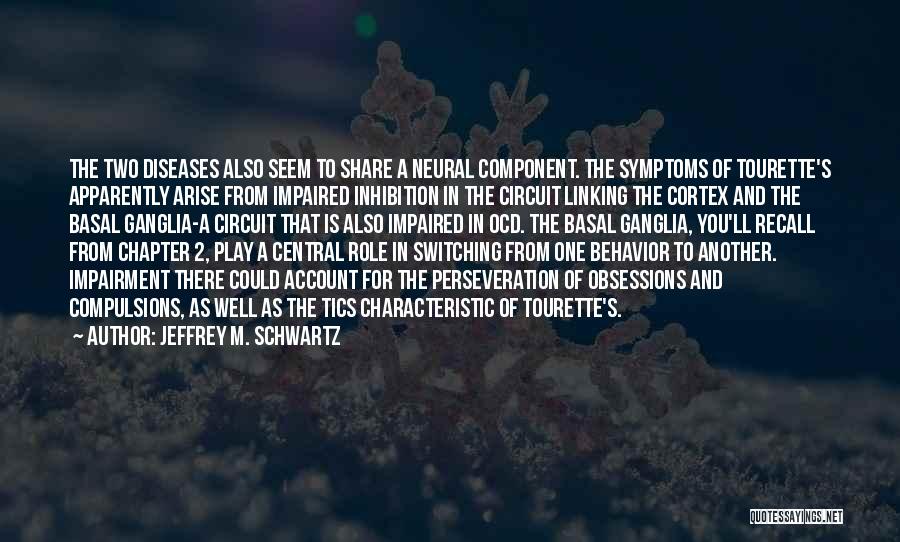
The two diseases also seem to share a neural component. The symptoms of Tourette's apparently arise from impaired inhibition in the circuit linking the cortex and the basal ganglia-a circuit that is also impaired in OCD. The basal ganglia, you'll recall from Chapter 2, play a central role in switching from one behavior to another. Impairment there could account for the perseveration of obsessions and compulsions, as well as the tics characteristic of Tourette's. — Jeffrey M. Schwartz
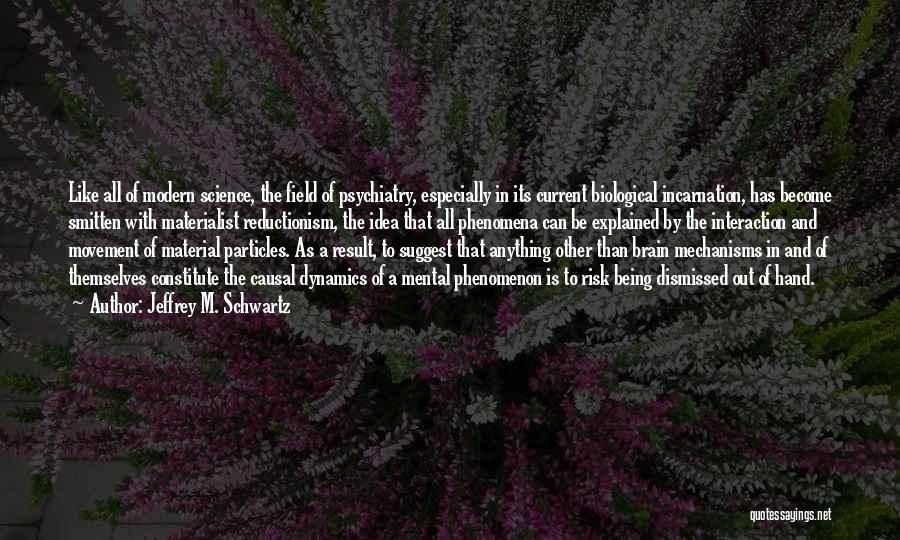
Like all of modern science, the field of psychiatry, especially in its current biological incarnation, has become smitten with materialist reductionism, the idea that all phenomena can be explained by the interaction and movement of material particles. As a result, to suggest that anything other than brain mechanisms in and of themselves constitute the causal dynamics of a mental phenomenon is to risk being dismissed out of hand. — Jeffrey M. Schwartz

The life we lead, in other words, leaves its mark in the form of enduring changes in the complex circuitry of the brain-footprints of the experiences we have had, the actions we have taken. This is neuroplasticity. As Mike Merzenich asserted, the mechanisms of neuroplasticity "account for cortical contributions to our idiosyncratic behavioral abilities and, in extension, for the geniuses, the fools, and the idiot savants among us. — Jeffrey M. Schwartz
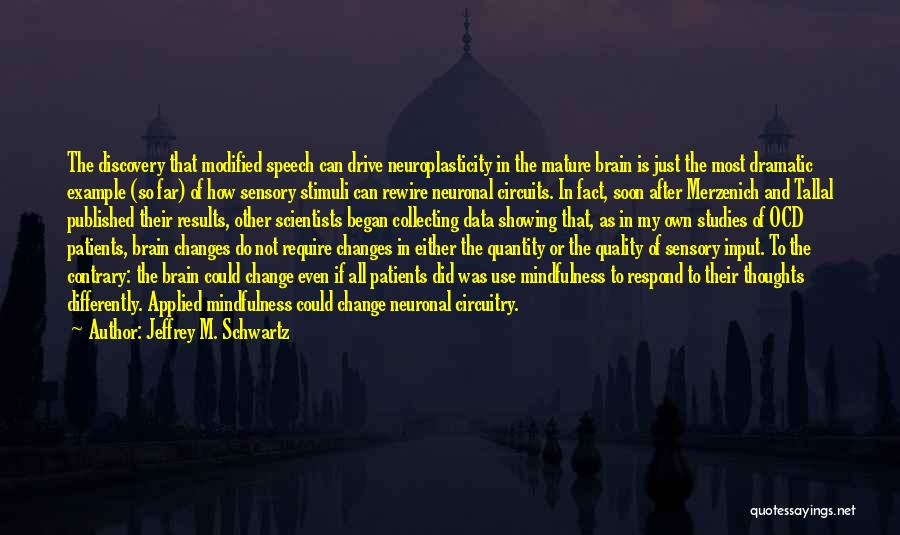
The discovery that modified speech can drive neuroplasticity in the mature brain is just the most dramatic example (so far) of how sensory stimuli can rewire neuronal circuits. In fact, soon after Merzenich and Tallal published their results, other scientists began collecting data showing that, as in my own studies of OCD patients, brain changes do not require changes in either the quantity or the quality of sensory input. To the contrary: the brain could change even if all patients did was use mindfulness to respond to their thoughts differently. Applied mindfulness could change neuronal circuitry. — Jeffrey M. Schwartz

the harmful strategies used to avoid and escape those uncomfortable sensations vary depending on the content of the deceptive brain messages and the patterns you have developed to attempt to deal with distress. The range of possible responses is endless and includes feeding an addiction, getting into an argument, avoiding a situation, shutting out the world, or endlessly checking something. — Jeffrey M. Schwartz
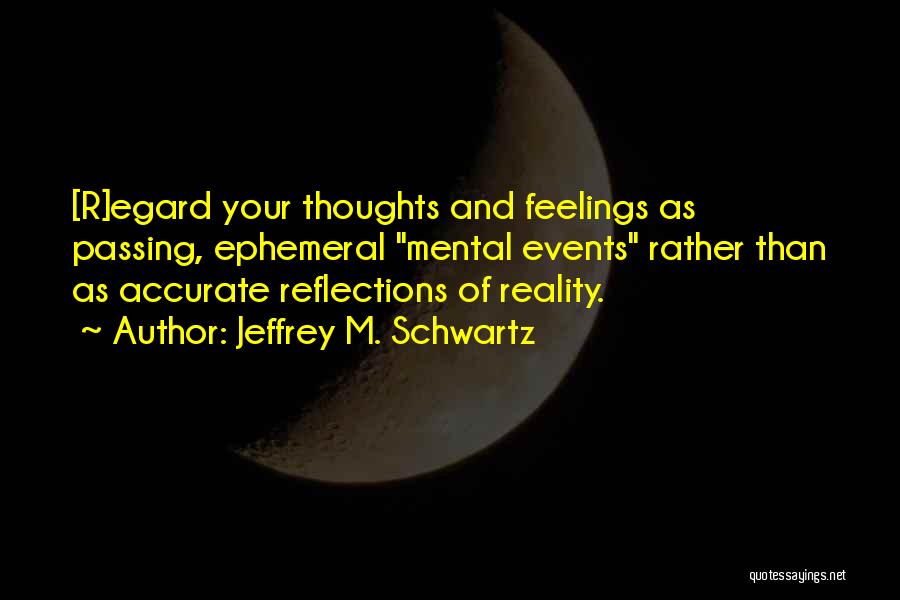
[R]egard your thoughts and feelings as passing, ephemeral "mental events" rather than as accurate reflections of reality. — Jeffrey M. Schwartz
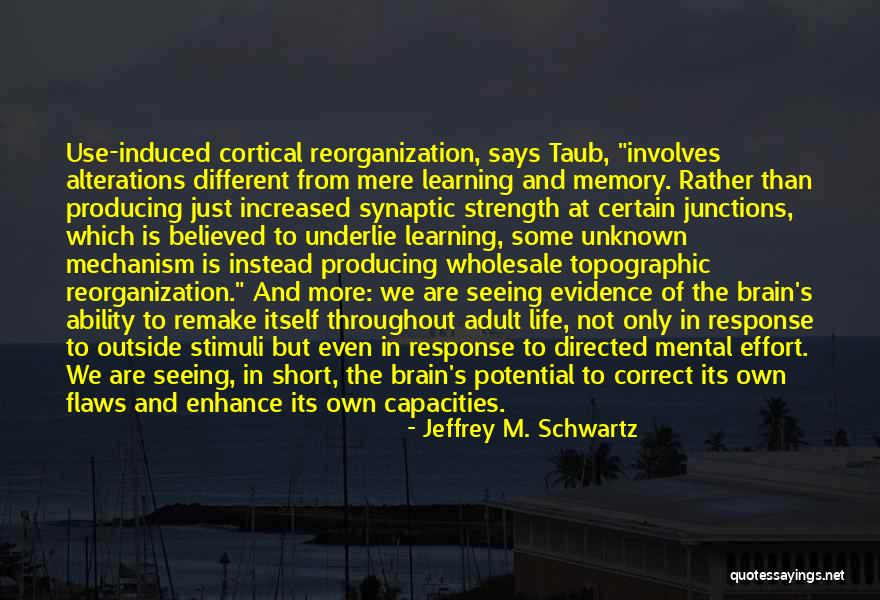
Use-induced cortical reorganization, says Taub, "involves alterations different from mere learning and memory. Rather than producing just increased synaptic strength at certain junctions, which is believed to underlie learning, some unknown mechanism is instead producing wholesale topographic reorganization." And more: we are seeing evidence of the brain's ability to remake itself throughout adult life, not only in response to outside stimuli but even in response to directed mental effort. We are seeing, in short, the brain's potential to correct its own flaws and enhance its own capacities. — Jeffrey M. Schwartz
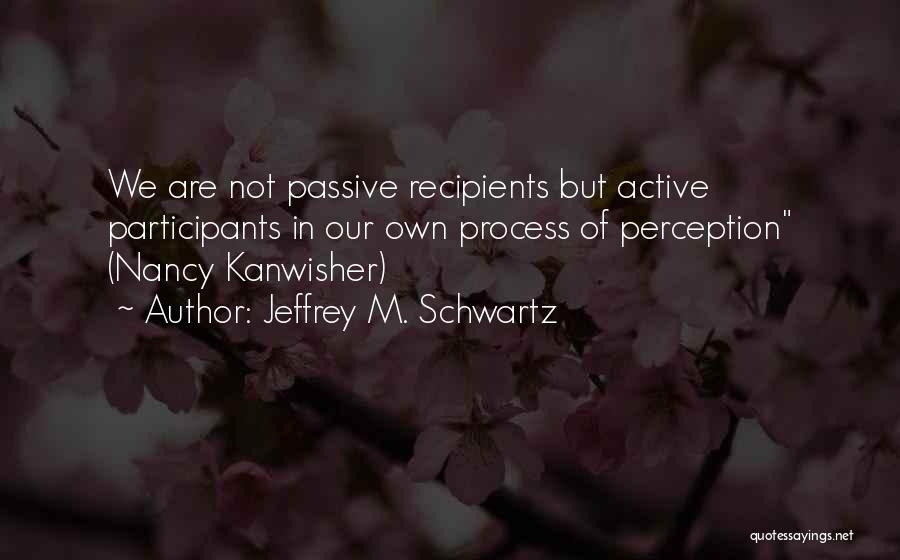
We are not passive recipients but active participants in our own process of perception" (Nancy Kanwisher) — Jeffrey M. Schwartz

ALLOW THE SENSATIONS TO BE PRESENT, BUT DO NOT ACT ON THEM This is probably the hardest thing to do when you start using the Four Steps. When you refuse to give in to the content of your deceptive brain messages by not performing the action your brain is telling you to do, your Uh Oh Center fires even more intensely, which makes you feel extremely uncomfortable. You want to do virtually anything to get rid of those sensations, both physical and emotional, and know that simply following your deceptive brain messages will accomplish that task in the short term. The problem, as we all must learn the hard way over time, is that doing so will only fuel the negative messages and further entrench the maladaptive circuits ever more powerfully into your brain. Said another way, short-term relief rapidly causes more pain and suffering, not less. — Jeffrey M. Schwartz
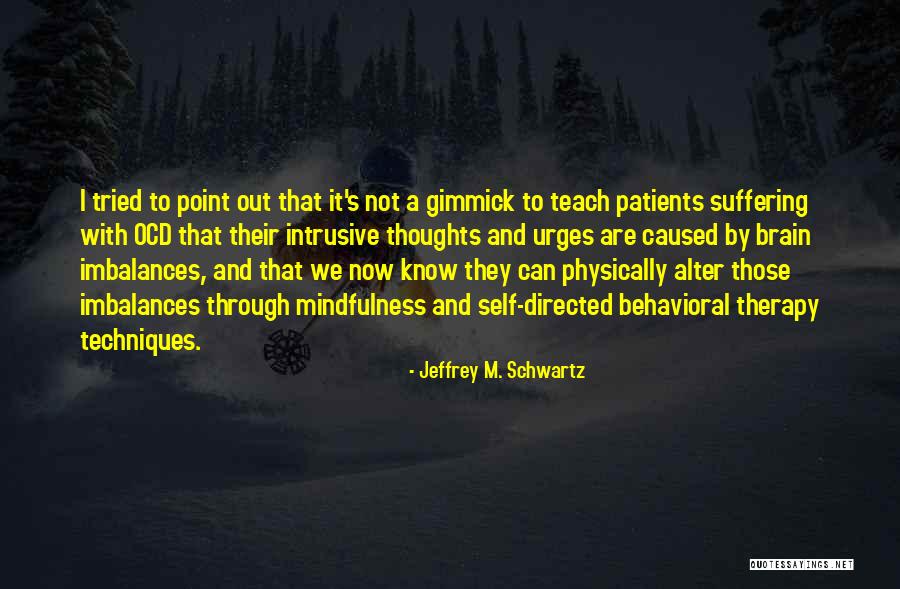
I tried to point out that it's not a gimmick to teach patients suffering with OCD that their intrusive thoughts and urges are caused by brain imbalances, and that we now know they can physically alter those imbalances through mindfulness and self-directed behavioral therapy techniques. — Jeffrey M. Schwartz

[F]ree will seems to violate all we know of how the world works, but as long as we cannot construct a logical proof of its nonexistence we cling to it tenaciously, even desperately. — Jeffrey M. Schwartz

Training in rapid acoustic discrimination can apparently induce the left prefrontal cortex, which is normally attuned to fast-changing acoustic stimuli but is disrupted in dyslexics, to do its job. The region, even in adults, remains "plastic enough...to develop such differential sensitivity after intensive training," the scientists concluded. — Jeffrey M. Schwartz
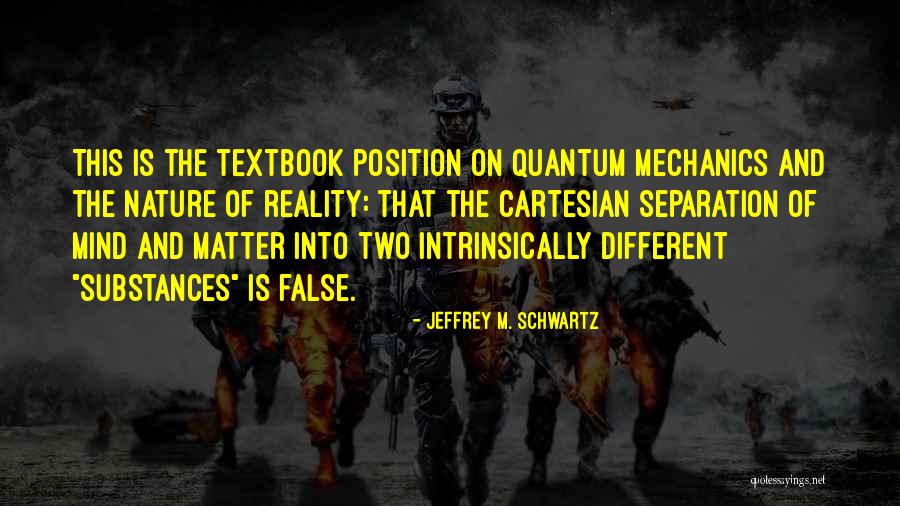
This is the textbook position on quantum mechanics and the nature of reality: that the Cartesian separation of mind and matter into two intrinsically different "substances" is false. — Jeffrey M. Schwartz
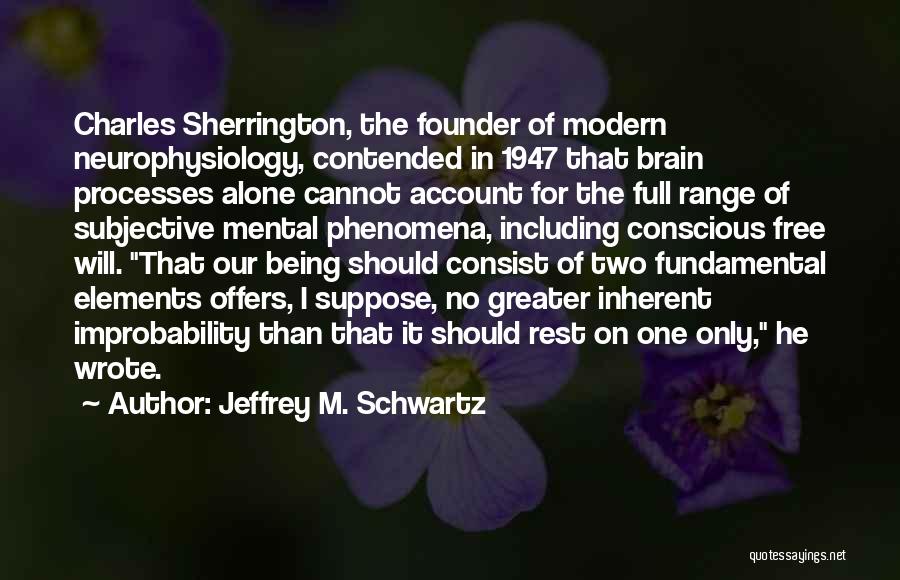
Charles Sherrington, the founder of modern neurophysiology, contended in 1947 that brain processes alone cannot account for the full range of subjective mental phenomena, including conscious free will. "That our being should consist of two fundamental elements offers, I suppose, no greater inherent improbability than that it should rest on one only," he wrote. — Jeffrey M. Schwartz

In ancient times, determinism rested on a belief in an omniscient God. Today, it is not old-time religion, but, rather, our culture's newfound faith - science - that challenges the belief in free will. — Jeffrey M. Schwartz

Carried to its logical limits, a system in which no one has a choice about what action to take is unworkable. — Jeffrey M. Schwartz
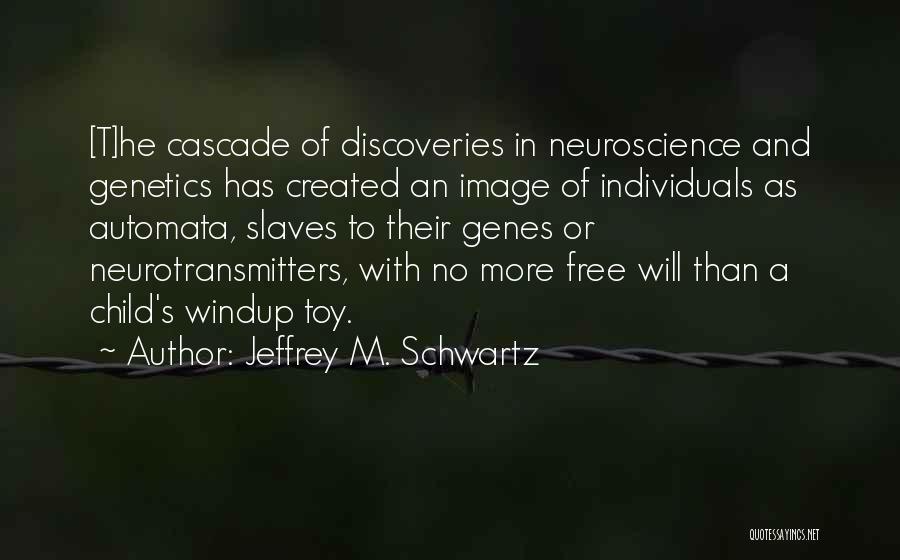
[T]he cascade of discoveries in neuroscience and genetics has created an image of individuals as automata, slaves to their genes or neurotransmitters, with no more free will than a child's windup toy. — Jeffrey M. Schwartz

The more often you act in these unhealthy ways, the more you teach your brain that what is simply a habit (a learned behavior) is essential to your survival. — Jeffrey M. Schwartz

Descartes's declaration that reality divides neatly into two realms reassured the Church that the province of science would never overlap, and therefore never challenge , the world of theology and the spiritual. Science ceded the soul and the conscious mind to religion and kept the material world for itself. In return for this neat dividing up of turf, Descartes hoped, religious leaders would lay off scientists who were studying natural laws operating in the physical, nonmental realm. The ploy was only partly successful for Church science relations. Descartes himself was forced to flee Paris for Holland in search of greater tolerance. — Jeffrey M. Schwartz
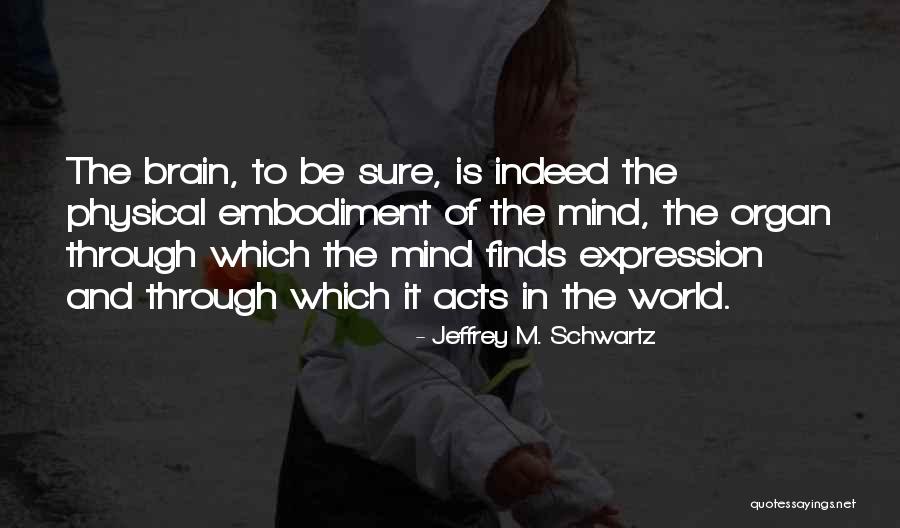
The brain, to be sure, is indeed the physical embodiment of the mind, the organ through which the mind finds expression and through which it acts in the world. — Jeffrey M. Schwartz

[M]aterialism clearly poses a bit of a problem for a central tenet of the justice system - namely, that people exert free will in their actions, including their criminal actions. If actions are merely the inevitable consequences of hard-wired brain circuitry - or, pushing the chain of causation back a step, of the genes we inherit from our parents - then the concept of genuine moral culpability becomes untenable. — Jeffrey M. Schwartz
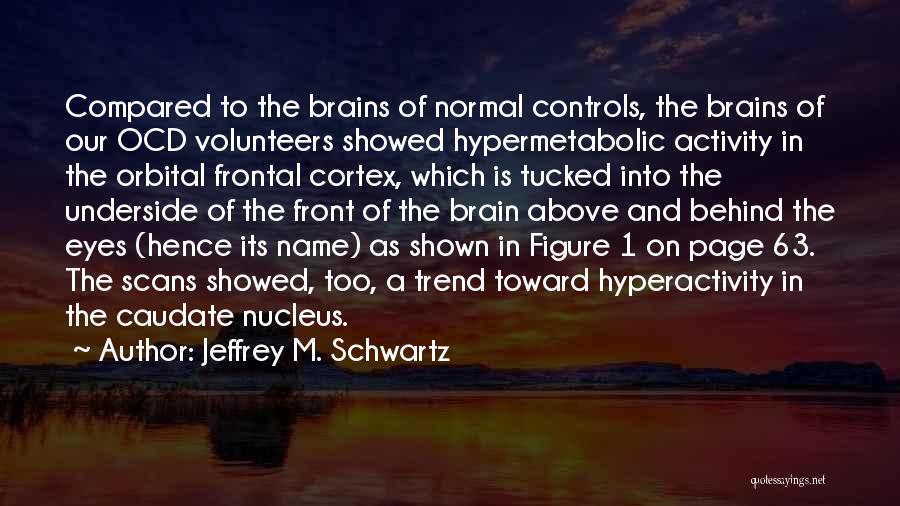
Compared to the brains of normal controls, the brains of our OCD volunteers showed hypermetabolic activity in the orbital frontal cortex, which is tucked into the underside of the front of the brain above and behind the eyes (hence its name) as shown in Figure 1 on page 63. The scans showed, too, a trend toward hyperactivity in the caudate nucleus. — Jeffrey M. Schwartz
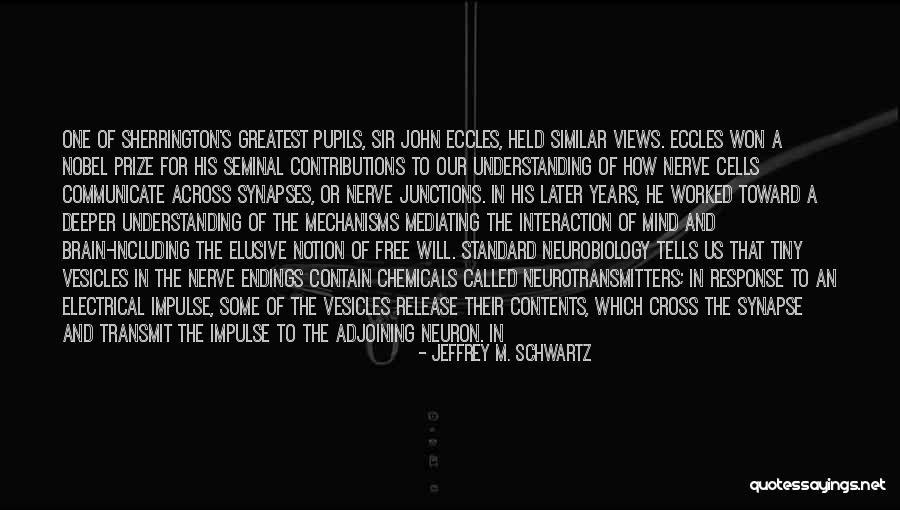
One of Sherrington's greatest pupils, Sir John Eccles, held similar views. Eccles won a Nobel Prize for his seminal contributions to our understanding of how nerve cells communicate across synapses, or nerve junctions. In his later years, he worked toward a deeper understanding of the mechanisms mediating the interaction of mind and brain-including the elusive notion of free will. Standard neurobiology tells us that tiny vesicles in the nerve endings contain chemicals called neurotransmitters; in response to an electrical impulse, some of the vesicles release their contents, which cross the synapse and transmit the impulse to the adjoining neuron. In 1986 Eccles proposed that the probability of neurotransmitter release depended on quantum mechanical processes, which can be influenced by the intervention of the mind. This, Eccles said, provided a basis for the action of a free will. — Jeffrey M. Schwartz

The essential achievement of the will is to attend to one object and hold it clear and strong before the mind, letting all others-its rivals for attention and subsequent action-fade away like starlight swamped by the radiance of the Sun. — Jeffrey M. Schwartz

If kittens do not receive visual input between thirty and eighty days after birth (a window of time now known as the critical period), it is too late: the unused eye is blind forever. — Jeffrey M. Schwartz

identify the cravings for what they are - a desire to feel better right now. — Jeffrey M. Schwartz

almost automatic response: "That's just a senseless obsession. It's a false message. I'm going to focus my attention on something else." At this point, the automatic transmission in your brain begins to start working properly again. — Jeffrey M. Schwartz
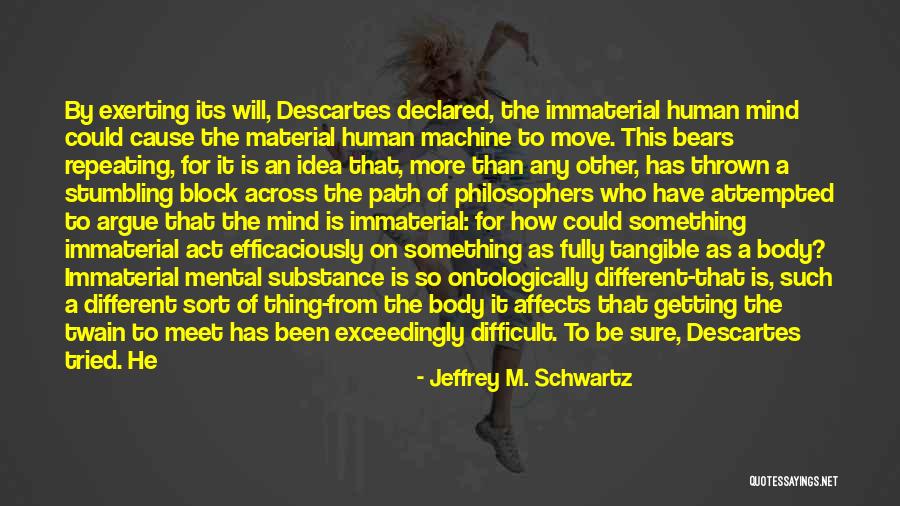
By exerting its will, Descartes declared, the immaterial human mind could cause the material human machine to move. This bears repeating, for it is an idea that, more than any other, has thrown a stumbling block across the path of philosophers who have attempted to argue that the mind is immaterial: for how could something immaterial act efficaciously on something as fully tangible as a body? Immaterial mental substance is so ontologically different-that is, such a different sort of thing-from the body it affects that getting the twain to meet has been exceedingly difficult. To be sure, Descartes tried. He argued that the mental substance of the mind interacts with the matter of the brain through the pineal gland, the organ he believed was moved directly by the human soul. The interaction allowed the material brain to be physically directed by the immaterial mind through what Descartes called "animal spirits"-basically a kind of hydraulic fluid. — Jeffrey M. Schwartz
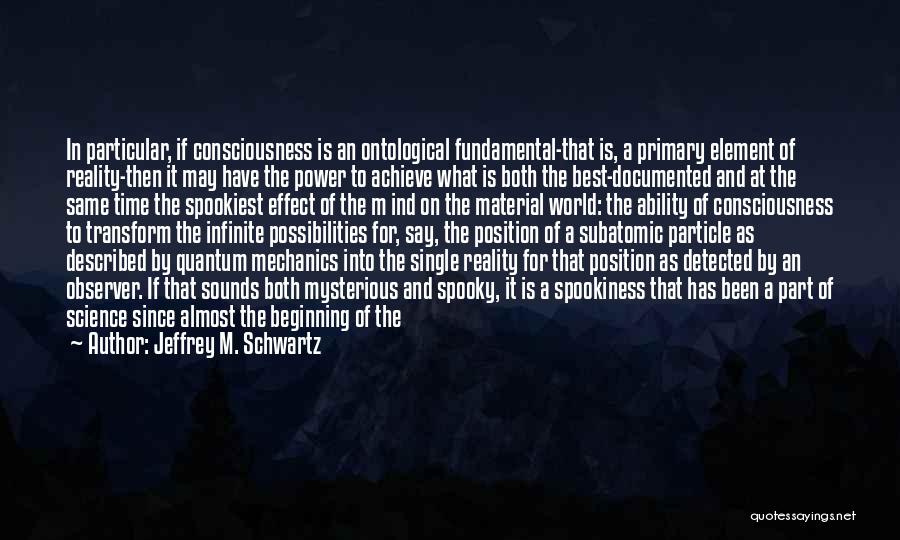
In particular, if consciousness is an ontological fundamental-that is, a primary element of reality-then it may have the power to achieve what is both the best-documented and at the same time the spookiest effect of the m ind on the material world: the ability of consciousness to transform the infinite possibilities for, say, the position of a subatomic particle as described by quantum mechanics into the single reality for that position as detected by an observer. If that sounds both mysterious and spooky, it is a spookiness that has been a part of science since almost the beginning of the twentieth century. It was physics that first felt the breath of this ghost, with the discoveries of quantum mechanics, and it is in the field of neuroscience and the problem of mind and matter that its ethereal presence is felt most markedly today. — Jeffrey M. Schwartz
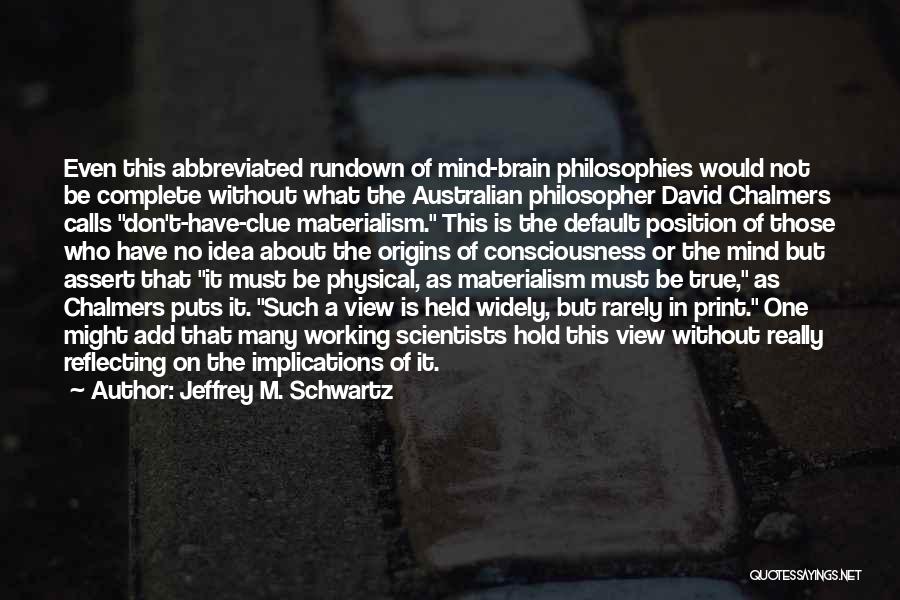
Even this abbreviated rundown of mind-brain philosophies would not be complete without what the Australian philosopher David Chalmers calls "don't-have-clue materialism." This is the default position of those who have no idea about the origins of consciousness or the mind but assert that "it must be physical, as materialism must be true," as Chalmers puts it. "Such a view is held widely, but rarely in print." One might add that many working scientists hold this view without really reflecting on the implications of it. — Jeffrey M. Schwartz
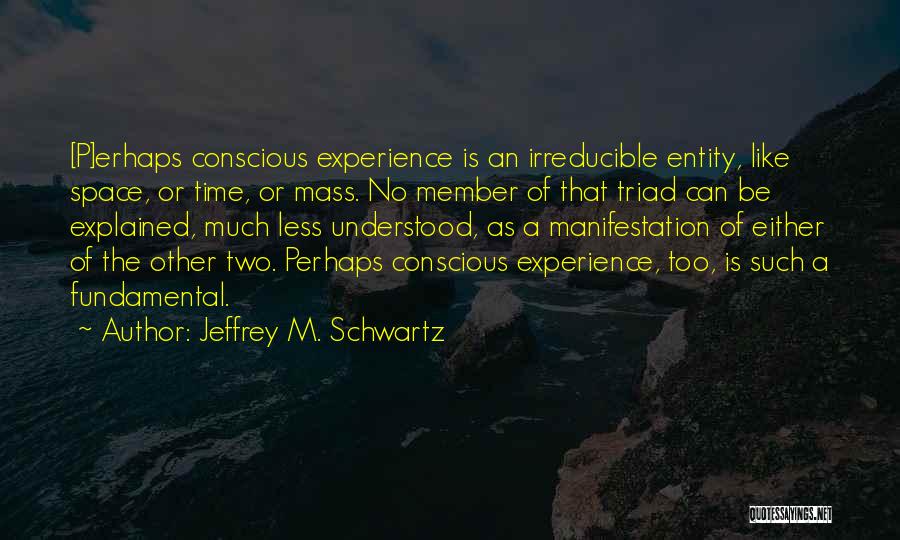
[P]erhaps conscious experience is an irreducible entity, like space, or time, or mass. No member of that triad can be explained, much less understood, as a manifestation of either of the other two. Perhaps conscious experience, too, is such a fundamental. — Jeffrey M. Schwartz
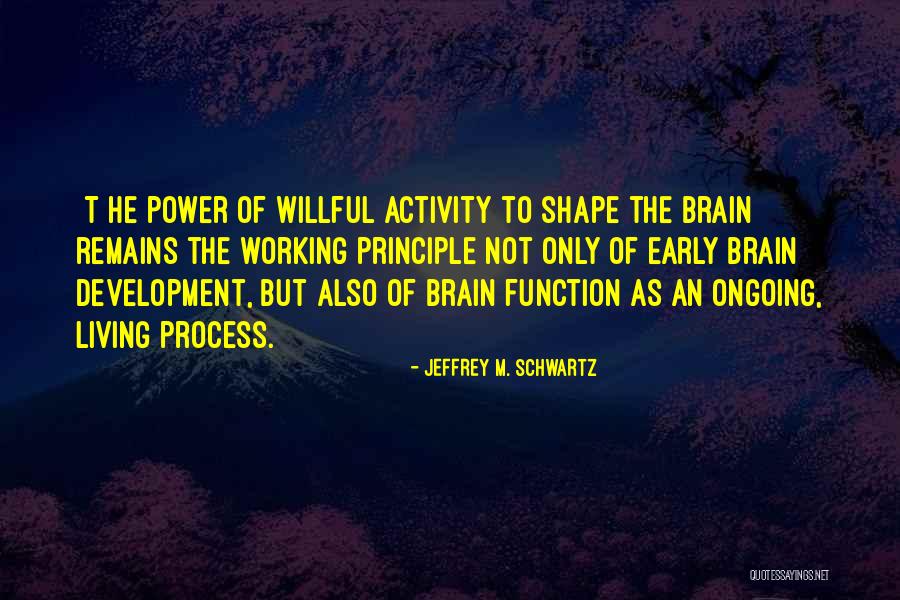
[T]he power of willful activity to shape the brain remains the working principle not only of early brain development, but also of brain function as an ongoing, living process. — Jeffrey M. Schwartz
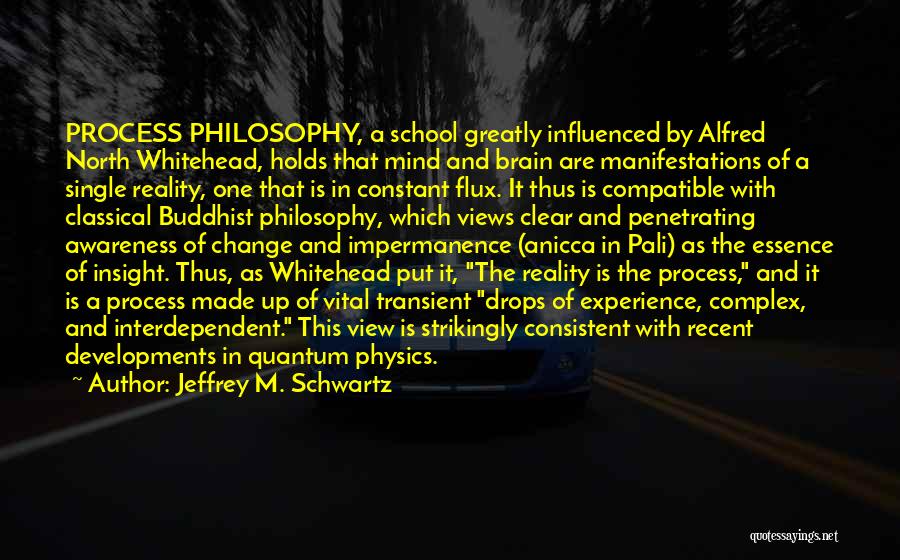
PROCESS PHILOSOPHY, a school greatly influenced by Alfred North Whitehead, holds that mind and brain are manifestations of a single reality, one that is in constant flux. It thus is compatible with classical Buddhist philosophy, which views clear and penetrating awareness of change and impermanence (anicca in Pali) as the essence of insight. Thus, as Whitehead put it, "The reality is the process," and it is a process made up of vital transient "drops of experience, complex, and interdependent." This view is strikingly consistent with recent developments in quantum physics. — Jeffrey M. Schwartz

THE FOUR STEPS Step 1: Relabel - Identify your deceptive brain messages and the uncomfortable sensations; call them what they really are. Step 2: Reframe - Change your perception of the importance of the deceptive brain messages; say why these thoughts, urges, and impulses keep bothering you: They are false brain messages (It's not ME, it's just my BRAIN!). Step 3: Refocus - Direct your attention toward an activity or mental process that is wholesome and productive - even while the false and deceptive urges, thoughts, impulses, and sensations are still present and bothering you. Step 4: Revalue - Clearly see the thoughts, urges, and impulses for what they are, simply sensations caused by deceptive brain messages that are not true and that have little to no value (they are something to dismiss, not focus on). — Jeffrey M. Schwartz
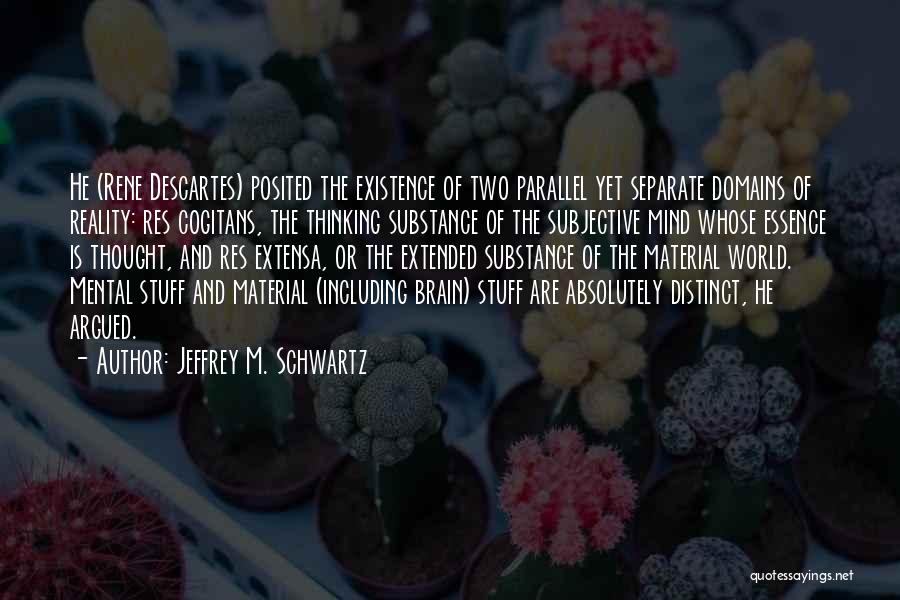
He (Rene Descartes) posited the existence of two parallel yet separate domains of reality: res cogitans, the thinking substance of the subjective mind whose essence is thought, and res extensa, or the extended substance of the material world. Mental stuff and material (including brain) stuff are absolutely distinct, he argued. — Jeffrey M. Schwartz
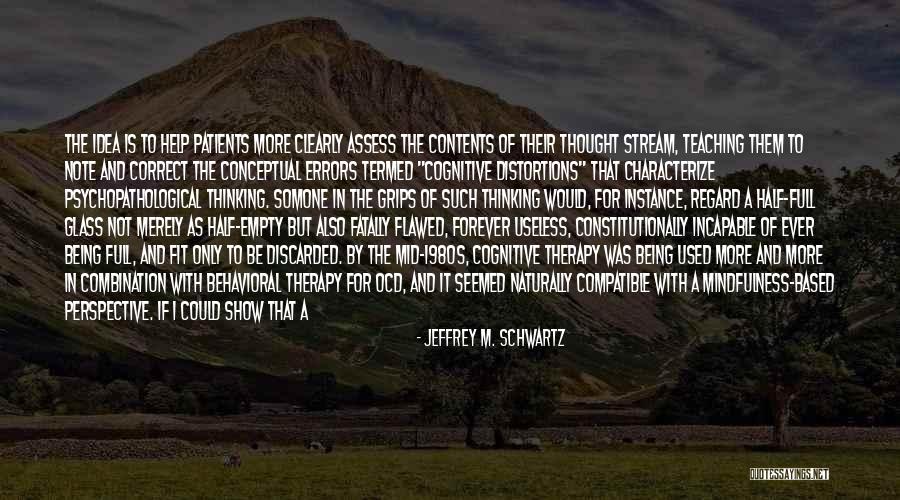
The idea is to help patients more clearly assess the contents of their thought stream, teaching them to note and correct the conceptual errors termed "cognitive distortions" that characterize psychopathological thinking. Somone in the grips of such thinking would, for instance, regard a half-full glass not merely as half-empty but also fatally flawed, forever useless, constitutionally incapable of ever being full, and fit only to be discarded. By the mid-1980s, cognitive therapy was being used more and more in combination with behavioral therapy for OCD, and it seemed naturally compatible with a mindfulness-based perspective. If I could show that a cognitive-behavioral approach, infused with mindful awareness, could be marshaled against the disease, and if successful therapy were accompanied by changes in brain activity, then it would represent a significant step toward demonstrating the causal efficacy of mental activity on neural circuits. — Jeffrey M. Schwartz
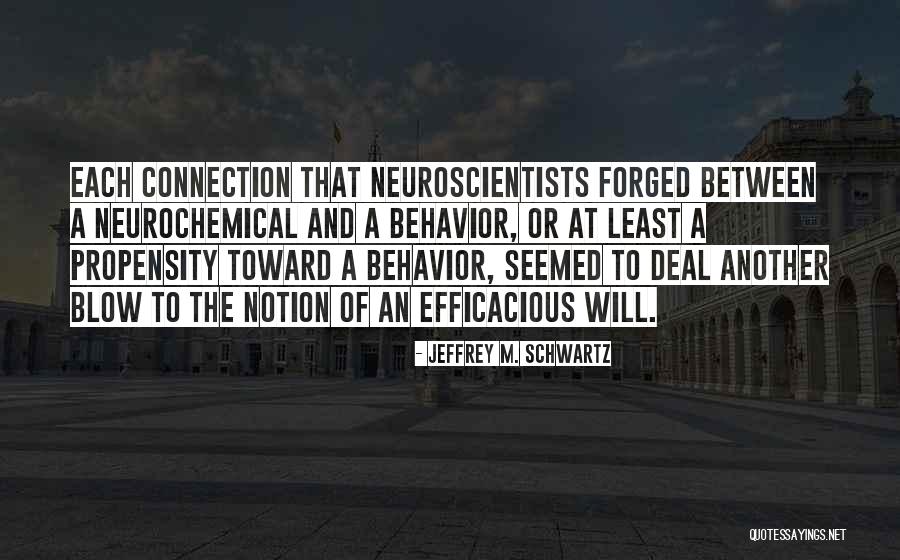
Each connection that neuroscientists forged between a neurochemical and a behavior, or at least a propensity toward a behavior, seemed to deal another blow to the notion of an efficacious will. — Jeffrey M. Schwartz

The area of the brain devoted to the reading finger of expert Braille readers was much larger than that of the nonreading finger, or of either index finger in nonreaders, Pascual-Leone found. It was a clear case of sensory input increase, with the person paying close attention, leading to an expansion of the brain region devoted to processing that input. — Jeffrey M. Schwartz
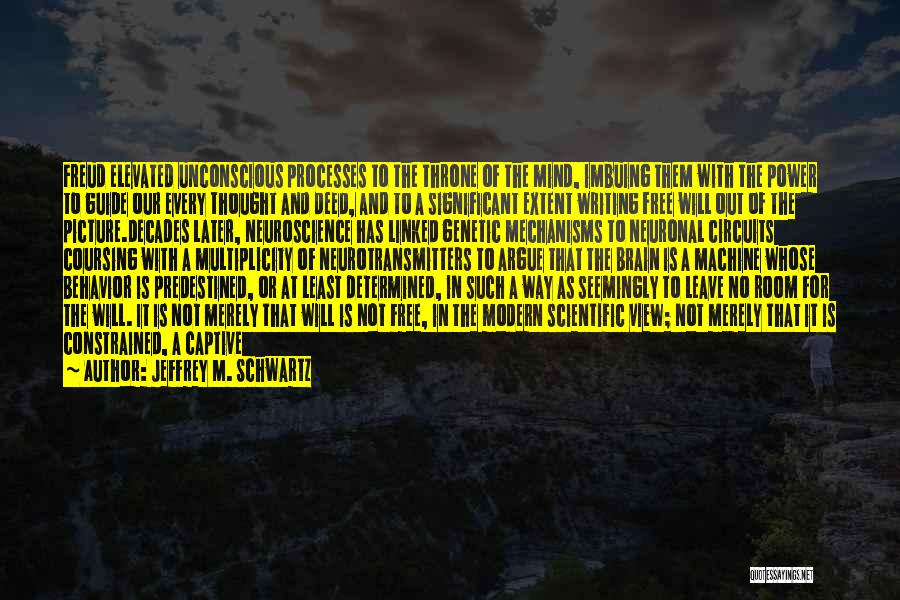
Freud elevated unconscious processes to the throne of the mind, imbuing them with the power to guide our every thought and deed, and to a significant extent writing free will out of the picture.
Decades later, neuroscience has linked genetic mechanisms to neuronal circuits coursing with a multiplicity of neurotransmitters to argue that the brain is a machine whose behavior is predestined, or at least determined, in such a way as seemingly to leave no room for the will. It is not merely that will is not free, in the modern scientific view; not merely that it is constrained, a captive of material forces. It is, more radically, that the will, a manifestation of the mind, does not even exist, because a mind independent of brain does not exist. — Jeffrey M. Schwartz
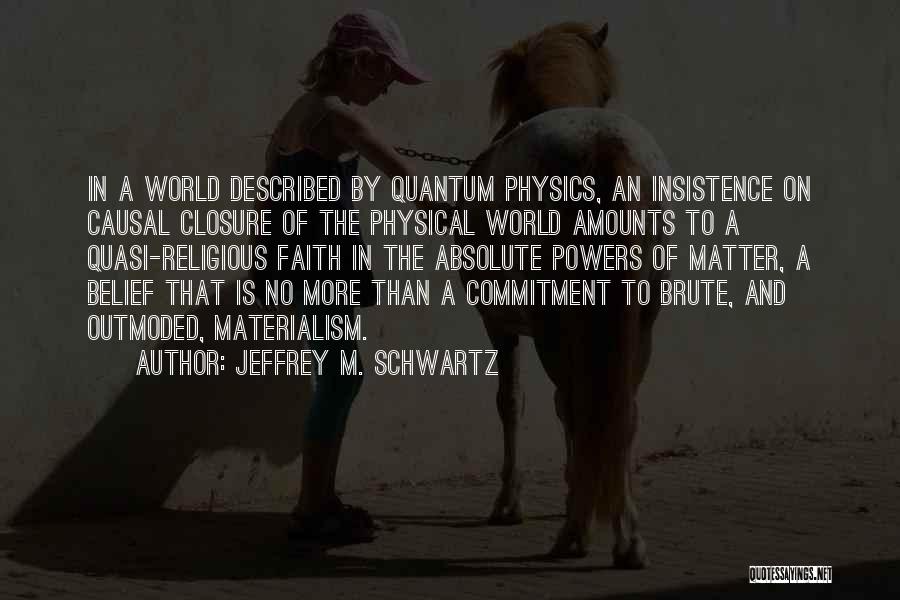
In a world described by quantum physics, an insistence on causal closure of the physical world amounts to a quasi-religious faith in the absolute powers of matter, a belief that is no more than a commitment to brute, and outmoded, materialism. — Jeffrey M. Schwartz

JOURNAL YOUR SUCCESSES To help you realize you truly are making progress, Steve gives this advice to people who are new to the Four Steps: "Write down the successes that you have early on because it encourages you to keep going. It's not always easy, but over the long haul, it does make a big difference and you will see how much progress you've made." The main point to keep in mind is that you want to focus on the things you have accomplished, no matter how small or inconsequential they seem to you. Do not minimize, ignore, or neglect even the most seemingly minuscule achievement. Rather, — Jeffrey M. Schwartz
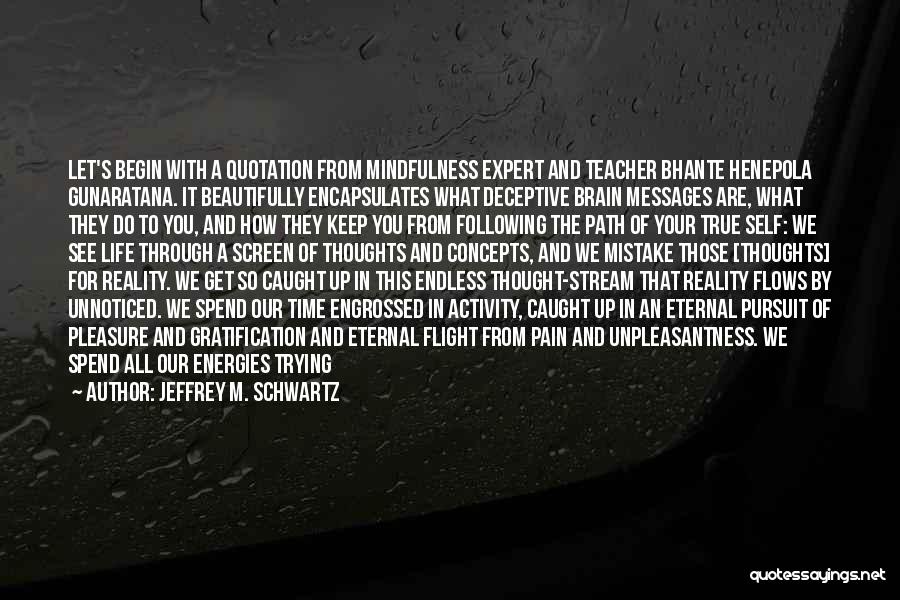
Let's begin with a quotation from mindfulness expert and teacher Bhante Henepola Gunaratana. It beautifully encapsulates what deceptive brain messages are, what they do to you, and how they keep you from following the path of your true self: We see life through a screen of thoughts and concepts, and we mistake those [thoughts] for reality. We get so caught up in this endless thought-stream that reality flows by unnoticed. We spend our time engrossed in activity, caught up in an eternal pursuit of pleasure and gratification and eternal flight from pain and unpleasantness. We spend all our energies trying to make ourselves feel better, trying to bury our fears, endlessly seeking security.16 To phrase it another way: We spend a considerable amount of our time engrossed in following deceptive brain messages until we begin to see them for what they are and value our true emotions and needs. — Jeffrey M. Schwartz
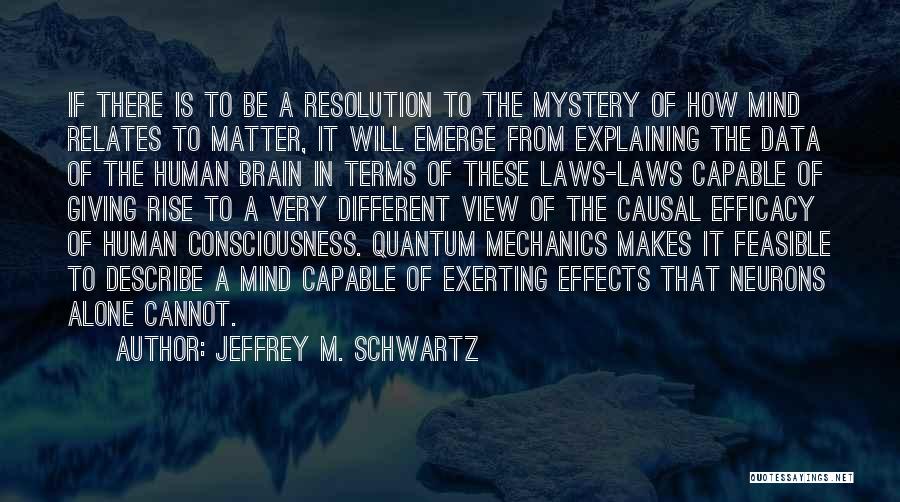
If there is to be a resolution to the mystery of how mind relates to matter, it will emerge from explaining the data of the human brain in terms of these laws-laws capable of giving rise to a very different view of the causal efficacy of human consciousness. Quantum mechanics makes it feasible to describe a mind capable of exerting effects that neurons alone cannot. — Jeffrey M. Schwartz
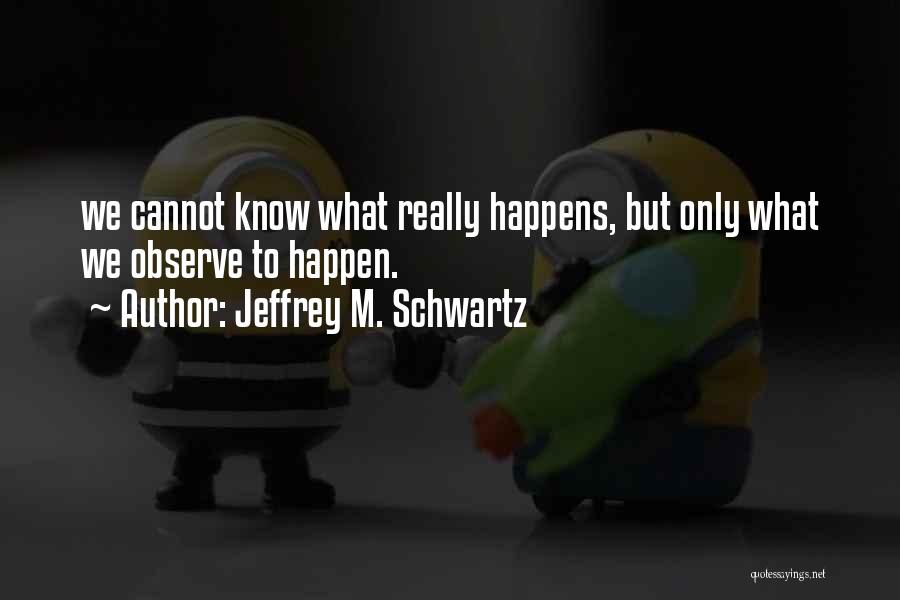
we cannot know what really happens, but only what we observe to happen. — Jeffrey M. Schwartz
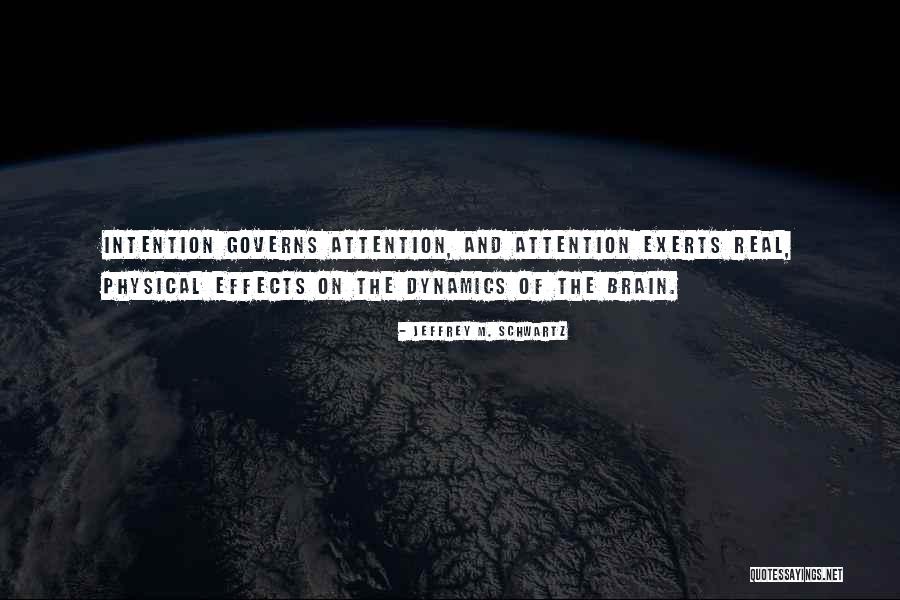
Intention governs attention, and attention exerts real, physical effects on the dynamics of the brain. — Jeffrey M. Schwartz

If there is a single fundamental underpinning in the intellectual tradition of Western scientific thought, it is arguably that there exists an unbridgeable divide between the world of mind and the world of matter, between the realm of the material (which is definitely real) and the realm of the immaterial (which, according to the conventions of science, is likely illusory). — Jeffrey M. Schwartz
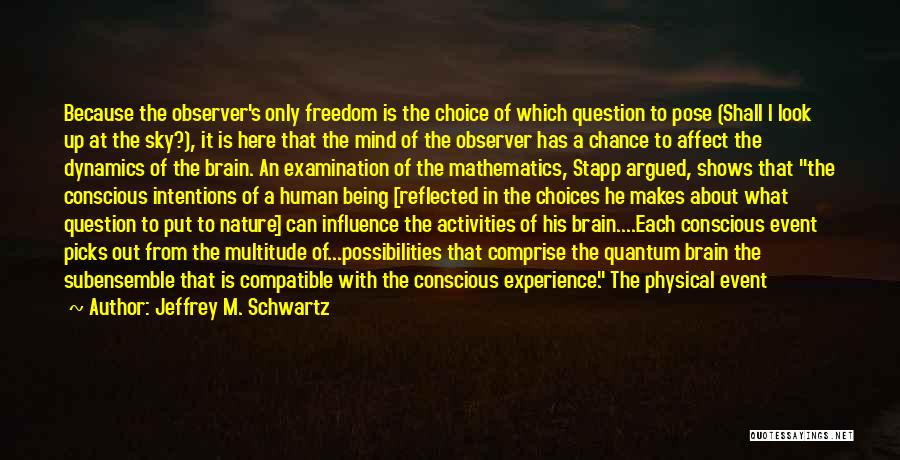
Because the observer's only freedom is the choice of which question to pose (Shall I look up at the sky?), it is here that the mind of the observer has a chance to affect the dynamics of the brain. An examination of the mathematics, Stapp argued, shows that "the conscious intentions of a human being [reflected in the choices he makes about what question to put to nature] can influence the activities of his brain....Each conscious event picks out from the multitude of...possibilities that comprise the quantum brain the subensemble that is compatible with the conscious experience." The physical event reduces the state of the brain to that branch of it that is compatible with the particular experience or observation. — Jeffrey M. Schwartz

The experience of learning how to Relabel, Reframe, Refocus, and Revalue was eye-opening for them because it allowed them to see that their time could be better spent on other pursuits and in healthier ways. — Jeffrey M. Schwartz
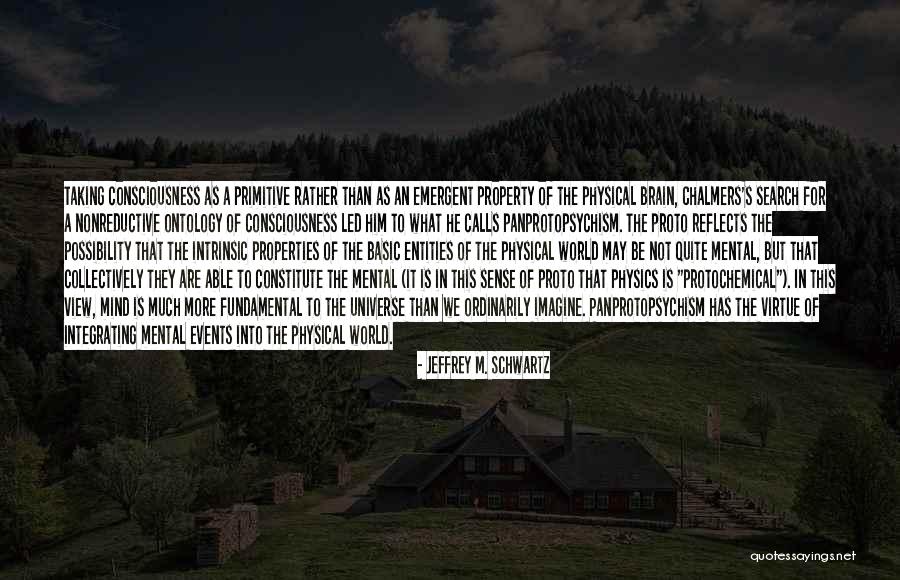
Taking consciousness as a primitive rather than as an emergent property of the physical brain, Chalmers's search for a nonreductive ontology of consciousness led him to what he calls panprotopsychism. The proto reflects the possibility that the intrinsic properties of the basic entities of the physical world may be not quite mental, but that collectively they are able to constitute the mental (it is in this sense of proto that physics is "protochemical"). In this view, mind is much more fundamental to the universe than we ordinarily imagine. Panprotopsychism has the virtue of integrating mental events into the physical world. "We need psychophysical laws connecting physical processes to subjective experience," Chalmers says. "Certain aspects of quantum mechanics lend themselves very nicely to this. — Jeffrey M. Schwartz





